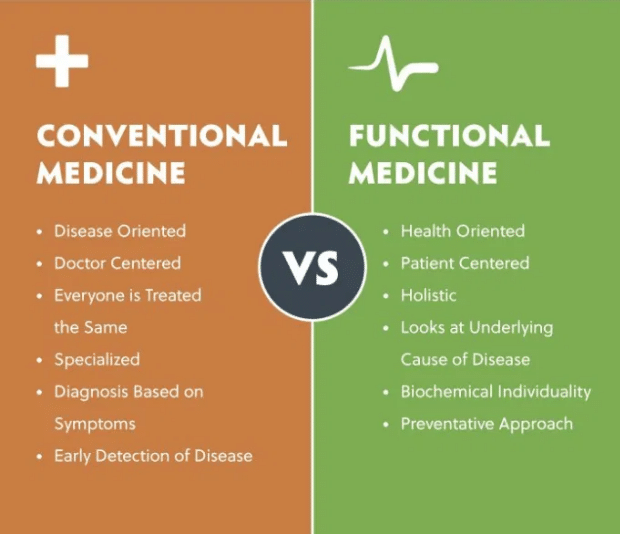Functional Medicine – The Truth About How Functional Medicine Actually Works
Functional Medicine - Full Explanation Of How Functional Medicine Works
What Is Functional Medicine?
 Functional Medicine is a holistic model to disease. It seeks to address the individualized, root cause of dysfunction utilizing lifestyle factors as the primary means of change.
Functional Medicine is a holistic model to disease. It seeks to address the individualized, root cause of dysfunction utilizing lifestyle factors as the primary means of change.
To do so, Functional Medicine does not at the symptoms as the problem, but rather, the clue. The symptom is what the patient doesn’t want, but what is causing it? And what needs to happen to correct it?
This is a unique approach that we at Thrive Health Systems embrace, and have used it to help many patients regain their qualify of life.
functional-medicine-explained
How Does Functional Medicine Work?
 A Functional Medicine approach will generally not use drugs or surgery to create a patient outcome, but instead seek to create a patient outcome through lifestyle modifications (including sleep, diet, movement, and other factors). A Functional Medicine approach will focus on the individual patient – their unique makeup – to understand what is causing their problem.
A Functional Medicine approach will generally not use drugs or surgery to create a patient outcome, but instead seek to create a patient outcome through lifestyle modifications (including sleep, diet, movement, and other factors). A Functional Medicine approach will focus on the individual patient – their unique makeup – to understand what is causing their problem.
A Functional Medicine approach is doctor-directed, with a focus on a natural, holistic approach to health.
What Kind Of Doctor Does Functional Medicine?
A Doctor of Chiropractic, Doctors of Naturopathy, and Doctors of Medicine may all practice Functional Medicine. Most practitioners require additional training and education, beyond their doctorate degree, in order to effectively practice functional medicine.
What Does A Functional Medicine Experience Look Like?
A functional medicine approach, by definition, is custom in nature. Every patient will have a different path to get to where they want to be, and that path should be created uniquely, for a patient and their individual needs and goals.
The process to get started would begin with a new patient consultation and case review. The doctor would review all the information presented by a patient, and understand the end results a patient is after. The patient would likely undergo extensive blood testing to understand why there is dysfunction, and what might be causing it. That blood testing will evaluate and measure various biomarkers, and compare them to a normal range. Once the blood test results are completed, they are returned to the patient and doctor, who review them together. The doctor should help the patient understand the results of the test, what they mean, and educate the patient on what might be causing their issues.
The doctor would then provide specific dietary and lifestyle modifications to address the issues that a patient is experiencing. They would formalize these recommendations in the context of a “plan”, a pathway to resolve the issues. Through this protocol, the goal would be to manage the errant biomarker (or biomarkers) to a normal range. Throughout this process, not only does the problematic biomarker return to normal range, but symptoms should show progress as well.
At the end of the process, there would be comparative bloodwork drawn to evaluate the progress of the patient. That bloodwork would be evaluated with the patient, and together they would conclude their engagement or extend it, based off the progress of the work and the desires of the patients.
Who Invented Functional Medicine?
 The practice of Functional Medicine is centuries old. Hippocrates is credited with saying “Let food be thy medicine, and medicine be thy food”.
The practice of Functional Medicine is centuries old. Hippocrates is credited with saying “Let food be thy medicine, and medicine be thy food”.
In modern times, several notable doctors have contributed to the concept of Functional Medicine, including Dr. Mark Hyman, MD, and Dr. Jeffrey Bland, PhD. The concept of using blood tests to manage objective biomarkers to normal range levels in humans, and emphasizing that those dysfunctions is why the symptoms exist, is the baseline foundation for a functional medicine practitioner.
Does Functional Medicine Really work?
In our experience, not all issues can be addressed with functional medicine successfully, or with only functional medicine. It depends on the case.
We have created several case studies which outline several Functional Medicine use cases, including inflammation, thyroid and immune issues, and blood sugar problems.
How Do I Know If Functional Medicine is Right for Me?
 It is always helpful to ask some good questions to a functional medicine practitioner (or any doctor):
It is always helpful to ask some good questions to a functional medicine practitioner (or any doctor):
1. Do you have experience treating ___________? (whatever your condition or symptom is)
2. How do you find out what is causing my issue?
3. How would you describe your healthcare philosophy?
4. Have you ever tried to address this kind of issue, and not succeeded? If so, why do you think that is?
5. What would I need to do for my part, as a patient, to have a successful outcome?
More Information
If you would like to claim a $19 Functional Medicine Consultation with a practitioner, you can click below and schedule a phone consultation.

